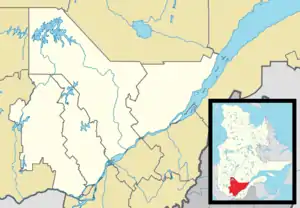Sainte-Famille-de-l'Île-d'Orléans
Sainte-Famille-de-l'Île-d'Orléans (Sainte-Famille prior to September 12, 2017) is a municipality in the L'Île-d'Orléans Regional County Municipality, Quebec, Canada, part of the administrative region of Capitale-Nationale. It is situated along the western shores of Island of Orléans.
Sainte-Famille-de-l'Île-d'Orléans | |
|---|---|
 | |
 Location within L'Île-d'Orléans RCM | |
 Ste-Famille-de-l'Île-d'Orléans Location in central Quebec | |
| Coordinates: 46°58′N 70°58′W[1] | |
| Country | |
| Province | |
| Region | Capitale-Nationale |
| RCM | L'Île-d'Orléans |
| Settled | 1660 |
| Constituted | July 1, 1855 |
| Government | |
| • Mayor | Jean Pierre Turcotte |
| • Federal riding | Montmorency—Charlevoix —Haute-Côte-Nord |
| • Prov. riding | Charlevoix–Côte-de-Beaupré |
| Area | |
| • Total | 50.70 km2 (19.58 sq mi) |
| • Land | 50.54 km2 (19.51 sq mi) |
| Population | |
| • Total | 850 |
| • Density | 16.8/km2 (44/sq mi) |
| • Pop 2016-2021 | |
| • Dwellings | 371 |
| Time zone | UTC−5 (EST) |
| • Summer (DST) | UTC−4 (EDT) |
| Postal code(s) | |
| Area code(s) | 418 and 581 |
| Highways | |
| Website | www |
Founded in 1661, Sainte-Famille-de-l'Île-d'Orléans is the oldest settlement on l'île d'Orléans and has one of the most important concentrations of houses of the old French regime.
History
In 1661, l'Île d'Orléans' first parish was formed and it was known until 1679 as Paroisse de l'Île. The parish municipality was first established in 1845 as La Sainte-Famille, abolished in 1847, and reestablished in 1855. The article 'La' disappeared in the 19th century.[1][4] A post office named Sainte-Famille-d'Orléans was opened in 1852.[5]
On September 12, 2017, the Parish Municipality of Sainte-Famille changed statutes and name to the Municipality of Sainte-Famille-de-l'Île-d'Orléans.[6]
Demographics
Population
| 2021 | 2016 | 2011 | |
|---|---|---|---|
| Population | 850 (-9.4% from 2016) | 938 (10.2% from 2011) | 851 (+0.8% from 2006) |
| Land area | 50.54 km2 (19.51 sq mi) | 48.76 km2 (18.83 sq mi) | 48.46 km2 (18.71 sq mi) |
| Population density | 16.8/km2 (44/sq mi) | 19.2/km2 (50/sq mi) | 17.6/km2 (46/sq mi) |
| Median age | 54.8 (M: 56.4, F: 52.8) | 53.5 (M: 53.4, F: 53.5) | 50.0 (M: 49.8, F: 50.2) |
| Private dwellings | 345 (total) | 445 (total) | 362 (total) |
| Median household income | $75,776 | $61,927 |
|
| ||||||||||||||||||||||||||||||||||||
| Source: Statistics Canada[12] | |||||||||||||||||||||||||||||||||||||
Language
| Canada Census Mother Tongue - Sainte-Famille-de-l'Île-d'Orléans, Quebec[12] | ||||||||||||||||||
|---|---|---|---|---|---|---|---|---|---|---|---|---|---|---|---|---|---|---|
| Census | Total | French |
English |
French & English |
Other | |||||||||||||
| Year | Responses | Count | Trend | Pop % | Count | Trend | Pop % | Count | Trend | Pop % | Count | Trend | Pop % | |||||
2016 |
930 |
915 | 98.4% | 10 | 1.1% | 0 | 0.0% | 5 | 0.5% | |||||||||
2011 |
815 |
795 | 97.6% | 10 | 1.2% | 0 | 0.0% | 10 | 1.2% | |||||||||
2006 |
805 |
805 | 100.0% | 0 | 0.0% | 0 | 0.0% | 0 | 0.0% | |||||||||
2001 |
875 |
865 | 98.9% | 10 | 1.1% | 0 | 0.0% | 0 | 0.0% | |||||||||
1996 |
875 |
875 | n/a | 100.0% | 0 | n/a | 0.0% | 0 | n/a | 0.0% | 0 | n/a | 0.0% | |||||
Cultural significance
In literature
- In The Spy Who Loved Me, Ian Fleming's ninth novel in his James Bond series, the narrator Vivienne Michel was born and raised in Sainte-Famille.
References
- "Sainte-Famille-de-l'Île-d'Orléans (Municipalité)" (in French). Commission de toponymie du Québec. Retrieved 2021-04-24.
- "Geographic code 20010 in the official Répertoire des municipalités". www.mamh.gouv.qc.ca (in French). Ministère des Affaires municipales et de l'Habitation.
- "Profile table, Census Profile, 2021 Census of Population - Sainte-Famille-de-l'Île-d'Orléans, Municipalité (MÉ) [Census subdivision], Quebec". 9 February 2022.
- Poirier, J. (1962). La toponymie de l'Ile d'Orléans. Cahiers de géographie du Québec, 6(12), 183–199S. See p. 194: L'article ne disparaît qu'au XIXe siècle.
- Poirier 1962, p. 197.
- "Interim List of Changes to Municipal Boundaries, Status, and Names, Table 1: Changes to census subdivisions by province and territory". Statistics Canada. November 14, 2018. Retrieved September 29, 2019.
- "2021 Community Profiles". 2021 Canadian Census. Statistics Canada. February 4, 2022. Retrieved 2022-04-27.
- "2016 Community Profiles". 2016 Canadian Census. Statistics Canada. August 12, 2021. Retrieved 2021-04-16.
- "2011 Community Profiles". 2011 Canadian Census. Statistics Canada. March 21, 2019. Retrieved 2014-04-18.
- "2006 Community Profiles". 2006 Canadian Census. Statistics Canada. August 20, 2019.
- "2001 Community Profiles". 2001 Canadian Census. Statistics Canada. July 18, 2021.
- 1996, 2001, 2006, 2011, 2016, 2021 census